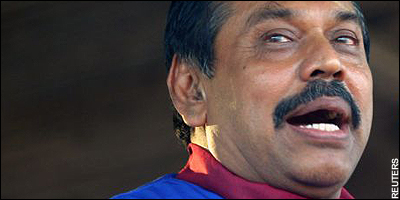Ilankai Tamil Sangam30th Year on the Web Association of Tamils of Sri Lanka in the USA |
||||
 Home Home Archives Archives |
Fears as UN Agencies Pull Out of Sri Lankan Conflict Zoneby Peter Foster, The Telegraph blog, UK, September 18, 2008
The news that UN agencies and other international NGOs have been ordered to pull out of the Tamil-controlled areas of northern Sri Lanka should be greeted with great foreboding.
Some international observers fear their departure clears the way for Sri Lankan forces to act with unrestrained ferocity against Tamil rebels and their civilian populations now caught up in the fighting. In recent weeks, one US-based rights group, TamilsAgainstGenocide, has even used the ‘G' word in the Sri Lankan context, engaging former US associate attorney general Bruce Fein to seek international war crimes indictments against three senior Sri Lankan officials, including the army chief, Gen Sarath Fonseka, who hold US green cards. The Sri Lankan government of Mahinda Rajapakse, a Sinhalese hardliner elected on a ‘war ticket' in November 2005, denies such charges (as you might expect) but his government's track record gives little cause for confidence that the basics of the Geneva Convention will be observed as this conflict intensifies to a new level. Over the last three years, Sri Lanka's police and security forces have waged a campaign of terror against both its Tamil enemies and dissenting Sinhalese, with abductions, beatings and extrajudicial killings being documented in considerable detail by both UN agencies, independent human rights groups and the US State Department. The Sri Lankan government protests its innocence, but time and again it has deliberately obstructed or simply ignored all attempts by the international community, including the US and British governments, to force it to act with greater restraint. Even the Sri Lankan government's own international panel of experts, set up with much fanfare to investigate alleged atrocities - including the massacre of 17 local aid workers for the French charity Action Contre le Faim in August 2006 - quit last March in disgust at the lack of co-operation it received, urging Sri Lanka to ‘achieve the full implementation of the rule of law and respect for fundamental human rights'. If the Sri Lankan government has nothing hide, it might seem reasonable to wonder why it obstructed its own commission of inquiry. In May of this year, in yet a further sign that Sri Lanka was fast becoming a pariah on the international stage, Sri Lanka lost its seat on the UN's Human Rights Council and all requests by the UN High Commissioner on Human Rights to set up a permanent office in Sri Lanka have been denied. When Louise Arbour, the UNHCR chief, visited last October she described the weakness of the rule of law and the ‘prevalence of impunity' as "alarming". Against this background of disregard for the international community, the removal of UN and other agencies from The Wanni in northern Sri Lanka is extremely ominous. The Sri Lankan government and its hardline Sinhalese supporters have made little secret of the fact that they regard these groups as little more than a frustrating obstacle to implementing a final, crushing victory over the Tamil rebels. I was in eastern Sri Lanka at the time of the ACF killings and remember reading a headline in the local newspaper describing i-NGOs as ‘The four letter word' of Sri Lankan politics, accusing them of ‘sponsoring' Tamil terrorists by allowing their resources, deliberately or otherwise, to strengthen the rebels' hand. With the eyes and ears of those organizations and the international community now being forcibly withdrawn, there is good reason to fear a period of terrible blood-letting in northern Sri Lanka. Whether or not that constitutes ‘genocide' is for the moment a matter of legal debate, but given the record of the Sri Lankan government it is legitimate to fear that a space is now being created in Northern Sri Lanka for a bout of ethnic score-settling, should Sri Lankan forces break through to Kilinochchi. The Sri Lankan government will protest its ‘honourable intentions'. It will say that it is eradicating the ‘scourge of terrorism' from Sri Lanka and that its aim is simply the military defeat of the Tamil Tigers. It will pour scorn on those human rights groups who talk of genocide. But given the performance of the Rajapakse government these last three years - and the grim litany of cruelties committed by both sides during Sri Lanka's 25-year vicious ethnic war - the outside world has alarmingly little reason to taking the assurances of the present Government of Sri Lanka at face value. |
|||
|
||||
